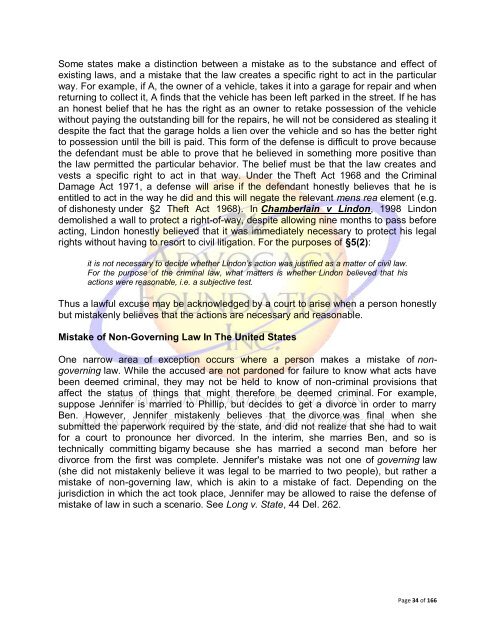You also want an ePaper? Increase the reach of your titles
YUMPU automatically turns print PDFs into web optimized ePapers that Google loves.
Some states make a distinction between a mistake as to the substance and effect of<br />
existing laws, and a mistake that the law creates a specific right to act in the particular<br />
way. For example, if A, the owner of a vehicle, takes it into a garage for repair and when<br />
returning to collect it, A finds that the vehicle has been left parked in the street. If he has<br />
an honest belief that he has the right as an owner to retake possession of the vehicle<br />
without paying the outstanding bill for the repairs, he will not be considered as stealing it<br />
despite the fact that the garage holds a lien over the vehicle and so has the better right<br />
to possession until the bill is paid. This form of the defense is difficult to prove because<br />
the defendant must be able to prove that he believed in something more positive than<br />
the law permitted the particular behavior. The belief must be that the law creates and<br />
vests a specific right to act in that way. Under the Theft Act 1968 and the Criminal<br />
Damage Act 1971, a defense will arise if the defendant honestly believes that he is<br />
entitled to act in the way he did and this will negate the relevant mens rea element (e.g.<br />
of dishonesty under §2 Theft Act 1968). In Chamberlain v Lindon, 1998 Lindon<br />
demolished a wall to protect a right-of-way, despite allowing nine months to pass before<br />
acting, Lindon honestly believed that it was immediately necessary to protect his legal<br />
rights without having to resort to civil litigation. For the purposes of §5(2):<br />
it is not necessary to decide whether Lindon’s action was justified as a matter of civil law.<br />
For the purpose of the criminal law, what matters is whether Lindon believed that his<br />
actions were reasonable, i.e. a subjective test.<br />
Thus a lawful excuse may be acknowledged by a court to arise when a person honestly<br />
but mistakenly believes that the actions are necessary and reasonable.<br />
Mistake of Non-Governing Law In The United States<br />
One narrow area of exception occurs where a person makes a mistake of nongoverning<br />
law. While the accused are not pardoned for failure to know what acts have<br />
been deemed criminal, they may not be held to know of non-criminal provisions that<br />
affect the status of things that might therefore be deemed criminal. For example,<br />
suppose Jennifer is married to Phillip, but decides to get a divorce in order to marry<br />
Ben. However, Jennifer mistakenly believes that the divorce was final when she<br />
submitted the paperwork required by the state, and did not realize that she had to wait<br />
for a court to pronounce her divorced. In the interim, she marries Ben, and so is<br />
technically committing bigamy because she has married a second man before her<br />
divorce from the first was complete. Jennifer's mistake was not one of governing law<br />
(she did not mistakenly believe it was legal to be married to two people), but rather a<br />
mistake of non-governing law, which is akin to a mistake of fact. Depending on the<br />
jurisdiction in which the act took place, Jennifer may be allowed to raise the defense of<br />
mistake of law in such a scenario. See Long v. State, 44 Del. 262.<br />
Page 34 of 166

















